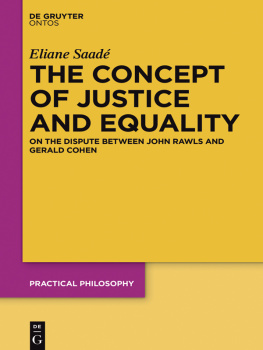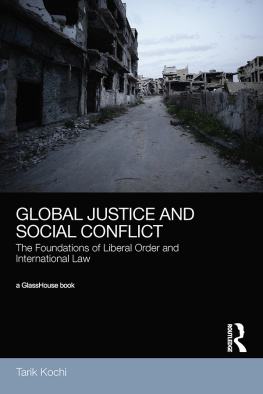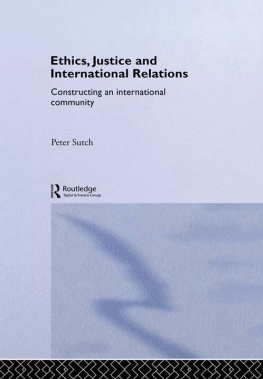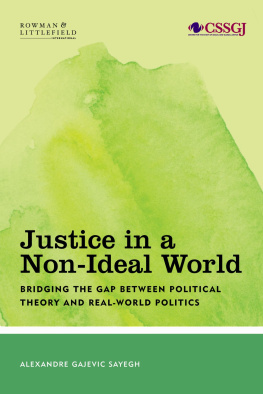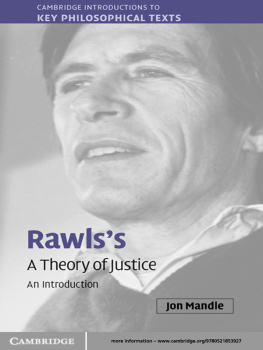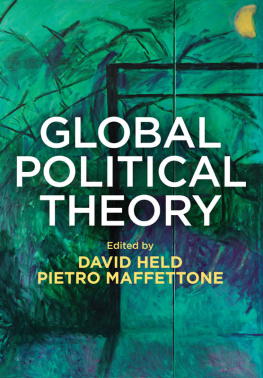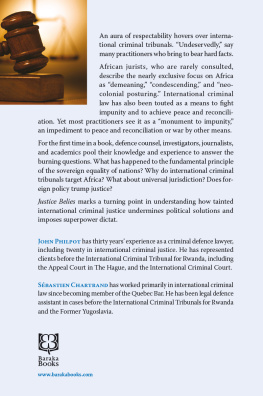Cover
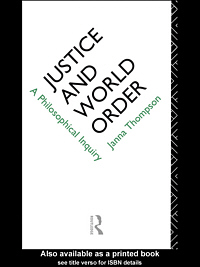
| title | : | Justice and World Order : A Philosophical Inquiry |
| author | : | Thompson, Janna. |
| publisher | : | Taylor & Francis Routledge |
| isbn10 | asin | : |
| print isbn13 | : | 9780203005538 |
| ebook isbn13 | : | 9780203312834 |
| language | : | English |
| subject | Justice, Justice and politics, International relations. |
| publication date | : | 2002 |
| lcc | : | JC578.T48 2002eb |
| ddc | : | 320/.01/1 |
| subject | : | Justice, Justice and politics, International relations. |
Page i
Justice and World Order
Page ii
This page intentionally left blank.
Page iii
Justice and World Order
A Philosophical Inquiry
Janna Thompson

London and New York
Page iv
First published 1992
by Routledge
11 New Fetter Lane, London EC4P 4EE
This edition published in the Taylor & Francis e-Library, 2002.
Simultaneously published in the USA and Canada
by Routledge
a division of Routledge, Chapman and Hall, Inc.
29 West 35th Street, New York, NY 10001
1992 Janna Thompson
All rights reserved. No part of this book may be reprinted or reproduced or utilized in any form or by any electronic, mechanical, or other means, now known or hereafter invented, including photocopying and recording, or in any information storage or retrieval system, without permission in writing from the publishers.
British Library Cataloguing in Publication Data
Thompson, Janna,
Justice and world order: a philosophical inquiry.
I. Title
341.552
Library of Congress Cataloging in Publication Data
Thompson, Janna
Justice and world order: a philosophical inquiry/Janna Thompson.
p. cm.
Includes bibliographical references (p. ) and index.
1. Justice. 2. Justice and politics. 3. International relations.
I. Title.
JC578.T48 1992 9130985
320.011dc20 CIP
ISBN 0-203-00553-8 Master e-book ISBN
ISBN 0-203-31283-X (OEB Format)
ISBN 0415070333
ISBN 0415070341 pbk
Page v
Contents
Introduction the problems of international justice: a survey | |
Part IFrom a cosmopolitan point of view |
Achieving perpetual peace: Kants universal history | |
Marxism and international relations | |
Cosmopolitan justice in a federation of sovereign states | |
Cosmopolitan justice in a world state | |
Part IIFrom a communitarian point of view |
The nation as a community | |
Towards a just world order | |
Page vi
This page intentionally left blank.
Page vii
Acknowledgements
I wish to thank all of the people who gave me help and encouragement, especially Professor H.J. McCloskey, Robert Young, John Campbell, Marion Tapper, Kim Lycos, Graeme Marshall, Mary Mulroney.
An earlier version of Chapter 6 was published as A rational world order: Hegel on international relations in International Journal of Moral and Social Studies 2, 2: 10518 (1987).
An earlier version of the Introduction was published as Towards a theory of international justice in Interdisciplinary Peace Research 2, 2: 322 (1990).
Page viii
This page intentionally left blank.
Page 1
Introduction the problems of international justice: a survey
Now that the stalemate caused in world affairs by the Cold War has ended and problems of environmental degradation and resource distribution loom so large, the time has come, so it seems, to make the establishment of a just international world order into a political priority. The way in which a philosopher can contribute to the achievement of this objective seems obvious. What is needed is a well-grounded, universally acceptable conception of international justice. There are, however, a number of serious difficulties which stand in the way of performing this task, or even beginning it. Two forms of scepticism come to the surface as soon as the topic of international justice is introduced. The first is a doubt about whether international justice is possible at all, whether any conception of justice, however well grounded, could have much or any influence on world politics. The second is a doubt about whether the philosopher, or anyone else, will ever be able to come up with an acceptable answer to the question: what is international justice? I will explore in this section what these doubts mean and why they exist.
A strong current of pessimism runs through many accounts of world affairs, fuelled by reports of crises, conflicts, threats, repression and war. World politics presents us with a spectacle of greed, cruelty and conflict of the most destructive kinds. Since justice seems to have little to do with how leaders generally act, observers are inclined to conclude that appeals to principles of justice are forever doomed to be made in vain. The obvious response to this pessimistic view of the world is to point out that the mere fact that injustice is rife in world affairs does not give us reason to believe that a just international world is impossible. Optimists are able to point to small signs of progress, less well-publicised but positive developments in peace-making, international law or international co-operation. Why shouldnt it be reasonable to hope that the
Page 2
end of the Cold War and the ideological divisions it created will make a just world more easy to achieve?
However, the pessimism which people so often express about the possibility of a just world is nourished by roots that go deeper than mere observation. It is based on a conception of the necessities governing the behaviour of agents in international affairs or on ideas about politics and human nature which seem to rule out the achievement of a truly just international order.
There are a number of starting places for this theoretically based pessimism. The first, and probably most familiar, is the set of positions commonly described as realist.1 The world, according to the realists, is an arena of conflict. Each state, pursuing its own interests in world affairs, will inevitably find itself in competition with others, for resources, allies, territory, influence. Since there is no authority, whether world government or dominant power, which can reliably force recalcitrant parties to obey a law, reach a settlement or keep the peace, each has to be prepared to defend its interests by force or the threat of force, and leaders must be concerned above all to maintain and enhance the power of their state. Given that the very survival of their society may be at stake, these leaders cannot afford to make justice their priority. States do what states must, and short of a radical and unlikely change in world politics international relations cannot be expected to be just.
Next page

